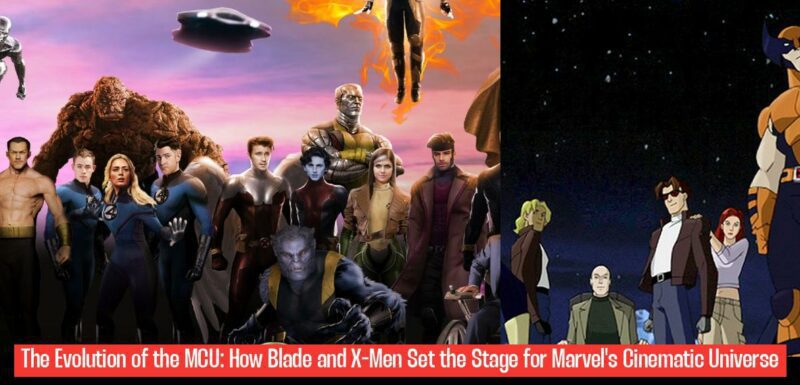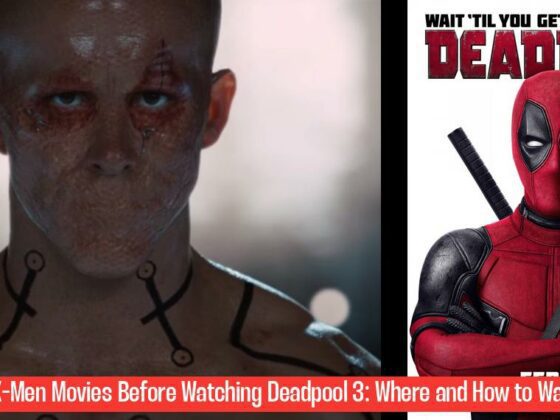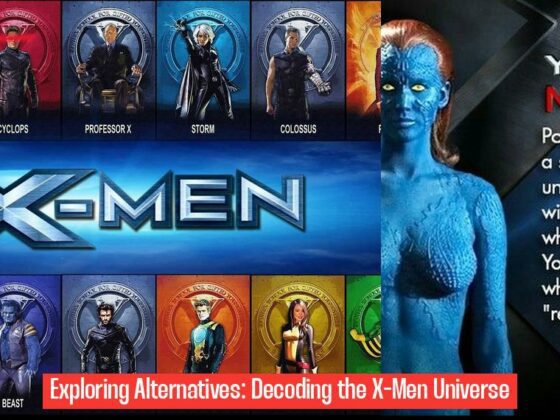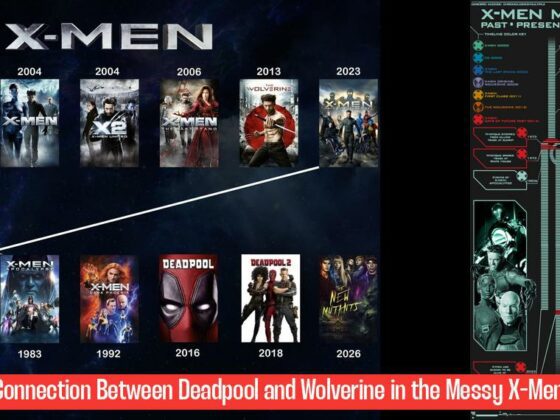Marvel Head Kevin Feige Reveals How Blade and X-Men Shaped the MCU
Kevin Feige, the mastermind behind the Marvel Cinematic Universe (MCU), has revealed the early superhero movies that shaped the MCU’s grand vision. In a recent interview, Feige shared his insights on how two iconic films, Blade and X-Men, paved the way for the cinematic universe we know and love today. Feige’s words paint a vivid picture of the challenges and triumphs of bringing superhero characters to life on the big screen, and how those early successes laid the foundation for the MCU’s future triumphs.
Feige points out that Blade, released in 1998, was a groundbreaking film that defied expectations. It was an R-rated superhero movie, a bold move at the time, and it shattered the prevailing notion that superhero movies were only for children. Blade‘s success demonstrated that superhero movies could be edgy, thrilling, and commercially viable, even with a darker tone and more mature themes. It was a watershed moment, proving that there was a market for a more mature and sophisticated approach to superhero films.
Feige also acknowledges the impact of X-Men, released in 2000, which further solidified the success of superhero films. X-Men, with its complex characters and engaging storylines, proved that superhero movies could be more than just action-packed spectacles. They could delve into deeper themes and explore moral dilemmas, resonating with audiences on a more profound level. X-Men‘s success laid the groundwork for a more nuanced and complex approach to superhero storytelling, paving the way for the MCU’s intricate world-building and interconnected narratives.
Feige emphasizes that both Blade and X-Men demonstrated that it didn’t matter if it was a lesser-known character or a top-selling comic book; what mattered was making the character stand out for audiences. This lesson was fundamental to the MCU’s success, as Feige and his team embraced lesser-known characters like Iron Man and Guardians of the Galaxy, and turned them into household names. The MCU’s success hinges on its ability to find compelling characters, regardless of their comic book popularity, and bring them to life in ways that resonate with a global audience.
Blade and X-Men‘s success helped to establish a tone, style, and methodology for superhero movies that would reverberate throughout the 2000s. These films demonstrated that superhero movies could be successful, even with darker themes and mature content. They also demonstrated that superhero movies could be more than just action-packed spectacles; they could delve into deeper themes and explore moral dilemmas, resonating with audiences on a more profound level. These early successes laid the foundation for the MCU’s success, proving that superhero movies could be both entertaining and commercially viable.
Blade’s Impact on the MCU
Blade, starring Wesley Snipes as the half-human, half-vampire superhero, was a critical and commercial success, generating a franchise that continued throughout the 2000s. Blade‘s success was pivotal in establishing the superhero genre as a viable option for mainstream Hollywood. It demonstrated that superhero movies could be gritty, stylish, and commercially successful, even with a darker tone and more mature themes. Blade‘s impact on the MCU is undeniable, as it proved that there was a market for a more mature and sophisticated approach to superhero films.
Feige has stated that Blade was one of the first superhero movies that he saw that made him believe that superhero movies could be more than just campy or childish. Blade‘s success helped to pave the way for the MCU’s success, as it showed that superhero movies could be both entertaining and commercially viable. Blade‘s success also demonstrated the importance of casting the right actor for the right role, as Snipes brought his own unique brand of intensity and charisma to the role of Blade.
Blade‘s success also demonstrated the importance of strong action sequences and special effects. The film’s action sequences were visceral and exciting, and the special effects were convincing and impressive. These factors contributed to Blade‘s success and influenced the MCU’s approach to action sequences and special effects. Blade‘s success helped to set the standard for superhero films, paving the way for the MCU’s success.
Blade‘s influence on the MCU can be seen in the MCU’s willingness to embrace darker themes and mature content. The MCU has produced films like Captain America: The Winter Soldier and Avengers: Infinity War, which explore complex moral dilemmas and feature intense action sequences. These films are a testament to the impact of Blade on the MCU, as they demonstrate that superhero movies can be both entertaining and thought-provoking.
Blade‘s success also paved the way for the MCU’s success in international markets. Blade was a global hit, and its success helped to open up international markets for superhero movies. The MCU’s success in international markets is a testament to the impact of Blade, as it showed that superhero movies could be successful around the world.
X-Men’s Influence on the MCU
X-Men, starring Hugh Jackman as Wolverine and Patrick Stewart as Professor X, was another critical and commercial success. X-Men established the superhero genre as a force in Hollywood, and its success helped to pave the way for the MCU’s success. X-Men‘s influence on the MCU is evident in the MCU’s commitment to strong characters, complex storylines, and exploration of social and political issues.
Feige has stated that X-Men showed that superhero movies could be more than just action-packed spectacles. X-Men‘s success proved that superhero movies could delve into deeper themes and explore moral dilemmas, resonating with audiences on a more profound level. X-Men‘s success also demonstrated the importance of casting the right actors for the right roles, as Jackman and Stewart brought their own unique brands of charisma and gravitas to their respective roles.
X-Men‘s influence on the MCU can be seen in the MCU’s willingness to explore complex social and political issues. The MCU has produced films like Black Panther and Captain America: Civil War, which explore themes of race, identity, and political power. These films are a testament to the impact of X-Men on the MCU, as they demonstrate that superhero movies can be both entertaining and thought-provoking.
X-Men‘s success also demonstrated the importance of world-building and mythology. X-Men created a rich and complex universe, with its own unique history, characters, and lore. The MCU has followed in X-Men‘s footsteps, creating a vast and interconnected universe, with its own unique history, characters, and lore. The MCU’s success is a testament to the impact of X-Men, as it showed that superhero movies can be both entertaining and engaging.
Read : Which 5 Superheroes Were Expelled from the Justice League?
X-Men‘s success also helped to establish the superhero genre as a viable option for television. X-Men spawned several television series, including X-Men: Evolution and Wolverine and the X-Men. The MCU followed in X-Men‘s footsteps, launching television series like Agents of S.H.I.E.L.D. and Daredevil. The MCU’s success on television is a testament to the impact of X-Men, as it showed that the superhero genre could translate to television.
The Lasting Legacy of Blade and X-Men
Blade and X-Men, two iconic superhero films, paved the way for the Marvel Cinematic Universe’s success. These films demonstrated that superhero movies could be both entertaining and commercially viable, even with darker themes and more mature content. They also demonstrated that superhero movies could be more than just action-packed spectacles; they could delve into deeper themes and explore moral dilemmas, resonating with audiences on a more profound level. The MCU’s success is a testament to the impact of these early superhero films, as they proved that superhero movies could be both entertaining and thought-provoking.
Blade and X-Men‘s influence on the MCU can be seen in the MCU’s commitment to strong characters, complex storylines, and exploration of social and political issues. The MCU’s success is a testament to the impact of these early superhero films, as they showed that superhero movies could be both entertaining and engaging.
The legacy of Blade and X-Men continues to inspire the MCU, as it continues to push the boundaries of superhero storytelling. The MCU’s future is bright, and it’s clear that the lessons learned from Blade and X-Men will continue to shape the MCU’s success for years to come.
What early superhero movies influenced the Marvel Cinematic Universe (MCU) according to Kevin Feige?
Blade and X-Men were the early superhero movies that shaped the MCU, as revealed by Kevin Feige.
How did Blade impact the superhero movie genre when it was released in 1998?
Blade, being an R-rated superhero movie with a darker tone and mature themes, shattered the notion that superhero movies were solely for children, demonstrating their edgy and commercially viable potential.
What was the significance of X-Men, released in 2000, in the evolution of superhero films according to Kevin Feige?
X-Men showcased that superhero movies could explore deeper themes, moral dilemmas, and complex characters, paving the way for a more nuanced and intricate approach to superhero storytelling, influencing the MCU’s world-building and interconnected narratives.
How did the success of Blade and X-Men contribute to the Marvel Cinematic Universe’s (MCU) approach to character selection?
The success of Blade and X-Men taught Kevin Feige and his team that the character’s popularity in comic books was not as crucial as making them compelling for audiences, leading to the embrace of lesser-known characters like Iron Man and Guardians of the Galaxy, which became integral to the MCU’s success.



